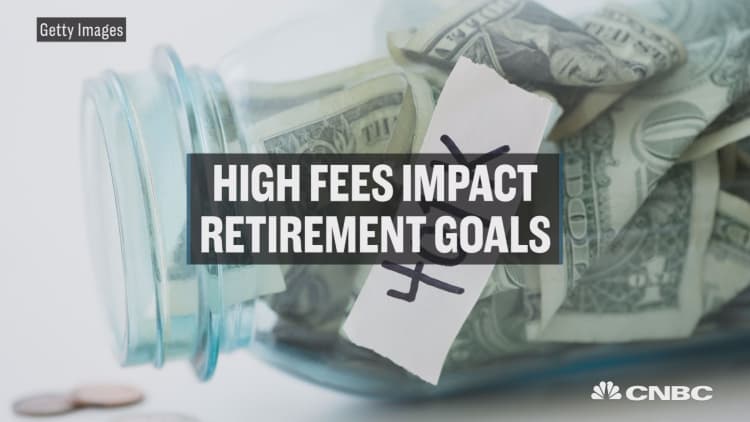Here's one way to determine if fees are devouring your retirement savings: Open up your mail.
About 6 out of 10 retirement plan participants are cracking open their annual 401(k) fee disclosures, according to a recent survey by Schwab Retirement Plan Services.
The company, an affiliate of Charles Schwab, polled 1,000 individuals in May, all of whom were contributors to their plans.
That means more than 40 percent of participants said they did not review their 401(k) fee disclosure documents. This annual report is mandated under a U.S. Labor Department regulation.
"Your employer must send out an annual disclosure showing the fees and investment performance for every fund in your 401(k) plan, all in one place," said Catherine Golladay, senior vice president, participant services and administration at Schwab Retirement Plan Services.
What you're paying matters because high fees erode your investment returns over time.
Know your fees
The cost of investing in a 401(k) has been falling.
Larger retirement plans tend to have lower costs: Their bigger asset base better positions them to negotiate lower fees, and they have access to cheaper institutional share classes.
"The biggest thing to look for is the fund fees," said Anthony Isola, a certified financial planner with Ritholtz Wealth Management.
"If it says you're paying 1 percent for a target-date fund, you have to ask yourself, 'What's going on here?'" he said. "It's diversified, but you're giving away so much return in those costs."
See below for a chart comparing total plan costs in 2009 to 2015.
Some of that decline is driven by shrinking fund fees.
For instance, as of 2017, investors in retirement plans were paying an average of 0.45 percent for equity mutual funds, according to the Investment Company Institute.
That's down from 0.77 percent in 2000.
"When choosing funds for your 401(k), look closely at the options available to you with an eye toward fees," Golladay said.
"Index mutual funds and exchange-traded funds often have lower investment management fees than other funds offered in a plan," she said.
But investment costs only tell part of the story.
You should still be aware of administrative fees, which cover the services your 401(k) record keeper will provide, and other additional expenses.
For instance, if you use your plan's brokerage window to buy investments that aren't on the main 401(k) menu, you'll likely pay higher fund fees.
Breaking it down

Since your fee disclosure contains cost and performance information on every fund in your retirement plan, reviewing it may seem intimidating.
Resist the urge to ignore the sizeable packet your plan sends you every year.
Here are a few things you should know, according to Golladay.
Dissect your fees: Your fee disclosure will list your fund costs as a dollar amount per $1,000 invested in your retirement plan.
Go cheap: If you have low-cost funds and they meet your retirement planning goals, you'll deploy more of your money in the market and spend less on fund fees.
Compare apples to apples: If you're comparing fund fees, compare it to others that are in the same asset class: Bonds with bonds, and stocks with stocks.
Don't get too tied up in performance: The tech stocks fund in your plan may be crushing its benchmark. That doesn't mean you should put all of your cash in it.
"Just because an investment has performed well historically, it doesn't mean it will continue to do so," Golladay said. "That's why diversification is important."
More from Your Money, Your Future
1 in 3 workers can't answer this question about their retirement savings
These are the only three times you should pull money from your 401(k)
Four reasons why your 401(k) might be a rip-off






